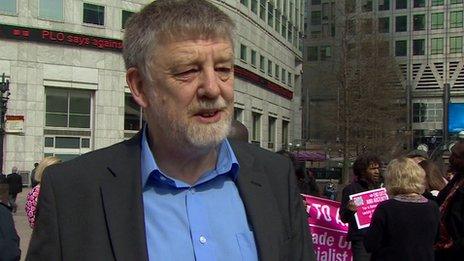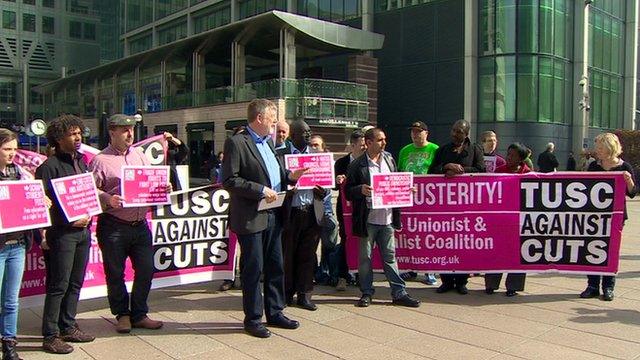Election 2015: TUSC launches '100% anti-austerity' manifesto
- Published
The party's chairman, the former MP Dave Nellist, said the economic recovery had not been shared by ordinary people
In the heart of London's Canary Wharf, a group has gathered in the glorious Friday morning sunshine.
In front of them is the headquarters of JP Morgan, the financial giant. Behind, the polished shopping centre that many financial workers frequent at lunch time.
But this group doesn't consist of bankers or financial workers. They are members and supporters of the Trade Unionist and Socialist Coalition (TUSC); a left-wing political group standing candidates across the UK at the general election.
One of them is the former Labour MP Dave Nellist.
"We're not all in the this together," he tells the assembled crowd. "We're here in the belly. There may be some - perhaps even many - of the 350,000 millionaires in Britain, perhaps even one or two of the 104 billionaires in Britain [here]."

Mr Nellist, who was thrown out of the Labour Party in the 1990s for refusing to pay the poll tax, is TUSC chair. He goes on to tell his supporters that there has been a mismatch since the financial crisis in 2008; £80bn in cuts to living standards and public services, he claims, have come at the same time as £80bn in bonuses for "the top financial people in these institutions."
He goes on: "Their economy has recovered, ours hasn't. TUSC stands to challenge that. That's what makes us different - we're the only 100% anti-austerity party."
Public ownership
TUSC was formed five years ago by Bob Crow, the late firebrand who led the RMT union. On 7 May, the party - which is backed by trade unions that are not affiliated to the Labour Party - is standing more than 130 candidates across Scotland, England and Wales. It is the "biggest party you've never heard of", says Mr Nellist.
The group's manifesto calls for the establishment of a "democratic socialist society", the immediate introduction of a £10 per hour minimum wage, rent controls, a "mass council home building programme" and public ownership of a number of institutions - including banks.

Dave Nellist says there is enough money to end to austerity
"Their wealth should be put to the service of working people", says Mr Nellist.
"We think there should be a trade-union based, socialist alternative to the big parties in this country and that's what we are trying to build."
'Masses of money'
Other commitments include the scrapping of tuition fees and an end to all spending cuts.
That sounds like the sort of thing a lot of parties would like to promise at this election, but how would it be funded?
"It's reliably estimated that wealthy corporations and individuals in this country get away with something like £120bn a year that they don't pay in tax," Mr Nellist says.
"That massively dwarfs the cuts that are taking place at the moment.
"But that's nothing. On top of that, there is somewhere the region of £375bn that the Bank of England found down the back of its sofa - over the last two or three years - to buy government debt and grease the wheels of the economy, called quantitative easing. That could be put to productive use.
"And even that's dwarfed by Deloitte's estimate that the top 100 companies in Britain have cash assets of some £750bn that they are waiting to invest because currently they are not making enough profits from it.
"I have no problem in finding masses of money in the country. The problem is it's not in the control, democratically, of the vast majority of the population."
'Fundamental differences'
The Labour Party was founded by the trade unions and they remain its biggest source of funding. But Mr Nellist is scathing about his former party.
He says it has "lost its way over the past few years", shedding its "core vote" because it lost its "core strategy". That's where he believes his party can offer something to the electorate.
"We still have the aspirations of the founders of the Labour Party - that is that the wealth of this country should be democratically owned and managed on behalf of the millions not the millionaires as core strategy."
Supporters of the Trade Unionist and Socialist Coalition have launched their manifesto for the 2015 general election. TUSC says it is fielding 135 candidates across England, Wales and Scotland. Three of them - Kingsley Abrams, Nancy Taaffe and Ed Potts - explain why.
Some of the policies at the heart of the party's campaign are being argued for by other parties. Labour wants to end zero hours contracts. The Greens want a £10 per hour minimum wage. The SNP thinks austerity has failed. What about TUSC's agenda is different?
"Look below the surface and there are fundamental differences between ourselves and other parties," says Mr Nellist.
Labour does not want to ban all zero hours contracts just some, he says, whilst the Greens don't want to a £10 minimum wage until 2020.
The party has decided not to stand against some Labour candidates who are fighting for similar agendas.
But Mr Nellist says presenting his party's message is important and it will use the election to raise its profile.
"A good result would be better visibility and an appreciation in many more people's minds of a viability that the argument we are putting forward and the party we are trying to create is worthwhile."
- Published10 April 2015
